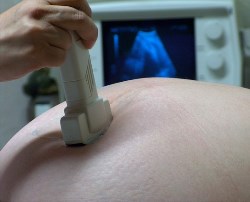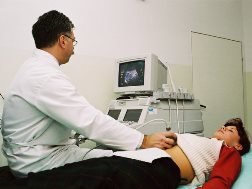How to Choose the Best Sonogram Tech Degree Program near Power North Dakota
 Once you have made a decision to pursue an ultrasound technician degree near Power ND, it’s time to start the process of picking a school. First, you must find the right program that will furnish the necessary training to become a qualified professional. And given that some states do require that ultrasound techs be either certified or licensed, depending on where you will practice you may also need preparation to pass a certification or licensing examination. So it’s very important that you research each program in order to evaluate and compare your options. But just where does one begin? Most prospective students will begin by looking for colleges that are within driving distance of their homes and then by comparing tuition. Naturally location and cost must be considered when arriving at a decision, but there are additional critical factors as well. Such as, if the ultrasound technician schools have earned accreditation or if they sponsor internship programs. These and other qualifications will be discussed more in detail later in this article. But to start with, let’s go over what an ultrasound tech does and the credentials and online education programs that are available.
Once you have made a decision to pursue an ultrasound technician degree near Power ND, it’s time to start the process of picking a school. First, you must find the right program that will furnish the necessary training to become a qualified professional. And given that some states do require that ultrasound techs be either certified or licensed, depending on where you will practice you may also need preparation to pass a certification or licensing examination. So it’s very important that you research each program in order to evaluate and compare your options. But just where does one begin? Most prospective students will begin by looking for colleges that are within driving distance of their homes and then by comparing tuition. Naturally location and cost must be considered when arriving at a decision, but there are additional critical factors as well. Such as, if the ultrasound technician schools have earned accreditation or if they sponsor internship programs. These and other qualifications will be discussed more in detail later in this article. But to start with, let’s go over what an ultrasound tech does and the credentials and online education programs that are available.
Click Here to Get Free Information on Ultrasound Technician Schools!
Ultrasound Tech Work Summary
 There are various acceptable titles for ultrasound techs (technicians). They are also referred to as ultrasound technologists, sonogram techs, and diagnostic medical sonographers (or just sonographers). Regardless of name, they all have the same primary job description, which is to perform diagnostic ultrasound procedures on patients. While a number of techs work as generalists there are specializations within the field, for example in cardiology and pediatrics. Most work in Power ND hospitals, clinics, private practices or outpatient diagnostic imaging centers. Standard daily job duties of a sonogram tech can consist of:
There are various acceptable titles for ultrasound techs (technicians). They are also referred to as ultrasound technologists, sonogram techs, and diagnostic medical sonographers (or just sonographers). Regardless of name, they all have the same primary job description, which is to perform diagnostic ultrasound procedures on patients. While a number of techs work as generalists there are specializations within the field, for example in cardiology and pediatrics. Most work in Power ND hospitals, clinics, private practices or outpatient diagnostic imaging centers. Standard daily job duties of a sonogram tech can consist of:
- Maintaining records of patient case histories and details of each procedure
- Counseling patients by explaining the procedures and answering questions
- Prepping the ultrasound machines for testing and then sterilizing and re-calibrating them
- Transferring patients to treatment rooms and making them comfortable
- Using equipment while minimizing patient exposure to sound waves
- Assessing results and determining necessity for additional testing
Ultrasound techs must regularly assess the safety and performance of their machines. They also are held to a high professional standard and code of conduct as medical practitioners. So as to maintain that degree of professionalism and stay current with medical knowledge, they are mandated to complete continuing education courses on an ongoing basis.
Ultrasound Technician Degrees Offered
 Ultrasound technician enrollees have the choice to acquire either an Associate Degree or a Bachelor’s Degree. An Associate Degree will generally require around 18 months to 2 years to complete based upon the course load and program. A Bachelor’s Degree will take longer at up to 4 years to finalize. Another alternative for individuals who have previously obtained a college degree is a post graduate certificate program. If you have received a Bachelor’s Degree in any major or an Associate Degree in a related health field, you can enroll in a certificate program that will require just 12 to 18 months to complete. One thing to keep in mind is that most ultrasound technician programs do have a clinical training element as part of their course of study. It often may be fulfilled by participating in an internship program which numerous schools set up with Power ND clinics and hospitals. When you have graduated from any of the degree or certificate programs, you will then have to satisfy the certification or licensing requirements in North Dakota or whatever state you decide to practice in.
Ultrasound technician enrollees have the choice to acquire either an Associate Degree or a Bachelor’s Degree. An Associate Degree will generally require around 18 months to 2 years to complete based upon the course load and program. A Bachelor’s Degree will take longer at up to 4 years to finalize. Another alternative for individuals who have previously obtained a college degree is a post graduate certificate program. If you have received a Bachelor’s Degree in any major or an Associate Degree in a related health field, you can enroll in a certificate program that will require just 12 to 18 months to complete. One thing to keep in mind is that most ultrasound technician programs do have a clinical training element as part of their course of study. It often may be fulfilled by participating in an internship program which numerous schools set up with Power ND clinics and hospitals. When you have graduated from any of the degree or certificate programs, you will then have to satisfy the certification or licensing requirements in North Dakota or whatever state you decide to practice in.
Online Sonographer Schools
 As previously mentioned, virtually all ultrasound technician schools have a practical component to their programs. So although you can earn a certificate or degree online, a significant portion of the training will be either conducted in an on-campus laboratory or at an approved off-campus medical care provider. Clinical training can often be fulfilled by means of an internship at a local Power ND outpatient clinic, hospital or private practice. However the remainder of the classes and training can be attended online in your Power home. This is particularly convenient for those individuals that keep working while getting their degrees. Plus online colleges are many times more affordable than on campus options. Expenses for study materials and commuting may be lessened as well. But just as with every sonography program you are considering, check that the online school you select is accredited. One of the most highly regarded accrediting organizations is the Commission on Accreditation of Allied Health Education Programs (CAAHEP). Accreditation is especially crucial for licensing, certification and finding employment (more on accreditation later). So if you are disciplined enough to attend classes away from the classroom in the convenience of your own home, then an online degree could be the ideal choice for you.
As previously mentioned, virtually all ultrasound technician schools have a practical component to their programs. So although you can earn a certificate or degree online, a significant portion of the training will be either conducted in an on-campus laboratory or at an approved off-campus medical care provider. Clinical training can often be fulfilled by means of an internship at a local Power ND outpatient clinic, hospital or private practice. However the remainder of the classes and training can be attended online in your Power home. This is particularly convenient for those individuals that keep working while getting their degrees. Plus online colleges are many times more affordable than on campus options. Expenses for study materials and commuting may be lessened as well. But just as with every sonography program you are considering, check that the online school you select is accredited. One of the most highly regarded accrediting organizations is the Commission on Accreditation of Allied Health Education Programs (CAAHEP). Accreditation is especially crucial for licensing, certification and finding employment (more on accreditation later). So if you are disciplined enough to attend classes away from the classroom in the convenience of your own home, then an online degree could be the ideal choice for you.
Subjects to Ask Sonogram Tech Colleges
 Once you have determined the type of degree or certificate that you would like to obtain, you can start the process of assessing and comparing sonogram tech schools. You will first probably want to choose whether you will access classes online or commute to a college campus in the Power ND area. Certainly location will be significant if you decide on the latter, and the price of tuition no doubt will be an important qualification also. But there are additional things that you should also take into account, for instance if the schools are accredited and if they provide internship programs. Therefore in order to complete your due diligence so that you can arrive at your ultimate selection, following are a few questions that you may want to ask each sonographer school prior to making a decision.
Once you have determined the type of degree or certificate that you would like to obtain, you can start the process of assessing and comparing sonogram tech schools. You will first probably want to choose whether you will access classes online or commute to a college campus in the Power ND area. Certainly location will be significant if you decide on the latter, and the price of tuition no doubt will be an important qualification also. But there are additional things that you should also take into account, for instance if the schools are accredited and if they provide internship programs. Therefore in order to complete your due diligence so that you can arrive at your ultimate selection, following are a few questions that you may want to ask each sonographer school prior to making a decision.
Are the Ultrasound Technician Programs Accredited? A large number of sonogram technician schools have obtained some type of accreditation, whether regional or national. However, it’s still important to verify that the school and program are accredited. Among the most highly regarded accrediting agencies in the field of sonography is the Joint Review Committee on Education in Diagnostic Medical Sonography (JRC-DMS). Programs obtaining accreditation from the JRC-DMS have gone through an extensive assessment of their teachers and educational materials. If the school is online it might also receive accreditation from the Distance Education and Training Council, which targets distance or online learning. All accrediting agencies should be acknowledged by the U.S. Department of Education or the Council on Higher Education Accreditation. Besides guaranteeing a superior education, accreditation will also help in obtaining financial aid and student loans, which are frequently not accessible for non-accredited programs. Accreditation might also be a pre-requisite for licensing and certification as required. And numerous Power ND employers will only hire graduates of an accredited school for entry level openings.
Are Internship Programs Sponsored? Find out if the ultrasound tech schools you are evaluating have partnerships with Power ND hospitals or clinics for internship programs. Internships are not only a great means to obtain practical training in a clinical environment, they are additionally a way to satisfy the practical training requirement for the majority of programs. As a supplemental benefit, they can assist students and graduates establish professional relationships in the Power medical community and help with obtaining employment.
Is Job Placement Help provided? You will probably wish to secure employment quickly after graduating, but getting that first job in a new field can be challenging without assistance. Ask if the ultrasound tech schools you are considering have job placement programs and what their success rates are. Rapid and high placement rates are a good sign that the schools have sizable networks and great relationships with North Dakota healthcare employers. It also confirms that their graduates are well regarded and sought after.
Where is the School Located? For a lot of students, the college they decide on will have to be within travelling distance of their Power ND residence. Students who have decided to attend online classes obviously will not have to worry themselves with the location of the campus. However, the availability of area internships will be of concern. One thing to bear in mind is that if you choose to enroll in a program that is out of state or perhaps out of your local area, you might be required to pay a higher tuition. State colleges typically charge higher tuitions for out of state residents. And community colleges normally charge a higher tuition to those students that live outside of their districts.
What Size are the Classes ? Unless you are the type of student that prefers to sit far in the rear of the classroom or hide in the crowd, you will undoubtedly want a small class size. Smaller classes enable more individual participation and personalized instruction. Ask the schools you are reviewing what the average teacher to student ratio is for their classes. If practical you may want to monitor one or more classes before making your final decision. This will also give you a chance to speak with a few of the students and instructors to get their perspectives regarding the sonogram tech program also.
Can the College Accommodate your Schedule? And finally you need to confirm that the ultrasound tech college you finally pick can provide the class schedule you need. This is particularly important if you opt to continue working while you attend school. If you need to schedule evening or weekend classes in the Power ND area, confirm that they are offered. If you can only enroll on a part-time basis, find out if that is an option and how many courses or credit hours you would have to enroll in. Also, learn what the procedure is for making up any classes that you might miss due to work, illness or family emergencies.
Ultrasound Technologist Training Power North Dakota
 Choosing the ideal sonographer degree or certificate program is a crucial first step to commencing a rewarding new profession furnishing diagnostic services to patients. Ultrasound technician colleges require that you have earned a high school diploma or a GED. In addition to satisfying academic requirements, you need to be in at least reasonably good physical health, capable of standing for lengthy periods and able to routinely lift weights of fifty pounds or more, as is it typically necessary to position patients and maneuver heavy machinery. Additional beneficial talents include technical aptitude, the ability to keep collected when confronted by an anxious or angry patient and the ability to communicate in a clear and compassionate manner. You originally came to this website due to an interest in Ultrasound Technologist Training and wanting more information on Ultrasound Tech School. However, as we have addressed in this article, there are several questions that you should ask each school you are looking at. This is true whether you select an online program or drive to the college campus to attend classes. And by asking the right questions so that you can evaluate each school, you can narrow down your options until you are left with the ideal school for your education. And with the right training, dedication and determination to succeed, you can achieve your goal to practice as an ultrasound tech in Power ND.
Choosing the ideal sonographer degree or certificate program is a crucial first step to commencing a rewarding new profession furnishing diagnostic services to patients. Ultrasound technician colleges require that you have earned a high school diploma or a GED. In addition to satisfying academic requirements, you need to be in at least reasonably good physical health, capable of standing for lengthy periods and able to routinely lift weights of fifty pounds or more, as is it typically necessary to position patients and maneuver heavy machinery. Additional beneficial talents include technical aptitude, the ability to keep collected when confronted by an anxious or angry patient and the ability to communicate in a clear and compassionate manner. You originally came to this website due to an interest in Ultrasound Technologist Training and wanting more information on Ultrasound Tech School. However, as we have addressed in this article, there are several questions that you should ask each school you are looking at. This is true whether you select an online program or drive to the college campus to attend classes. And by asking the right questions so that you can evaluate each school, you can narrow down your options until you are left with the ideal school for your education. And with the right training, dedication and determination to succeed, you can achieve your goal to practice as an ultrasound tech in Power ND.
More Ultrasound Locations in North Dakota
Nd:YAG laser
Nd:YAG (neodymium-doped yttrium aluminum garnet; Nd:Y3Al5O12) is a crystal that is used as a lasing medium for solid-state lasers. The dopant, triply ionized neodymium, Nd(III), typically replaces a small fraction (1%) of the yttrium ions in the host crystal structure of the yttrium aluminum garnet (YAG), since the two ions are of similar size.[1] It is the neodymium ion which provides the lasing activity in the crystal, in the same fashion as red chromium ion in ruby lasers.[1]
Nd:YAG lasers are optically pumped using a flashtube or laser diodes. These are one of the most common types of laser, and are used for many different applications. Nd:YAG lasers typically emit light with a wavelength of 1064 nm, in the infrared.[3] However, there are also transitions near 946, 1120, 1320, and 1440 nm. Nd:YAG lasers operate in both pulsed and continuous mode. Pulsed Nd:YAG lasers are typically operated in the so-called Q-switching mode: An optical switch is inserted in the laser cavity waiting for a maximum population inversion in the neodymium ions before it opens. Then the light wave can run through the cavity, depopulating the excited laser medium at maximum population inversion. In this Q-switched mode, output powers of 250 megawatts and pulse durations of 10 to 25 nanoseconds have been achieved.[4] The high-intensity pulses may be efficiently frequency doubled to generate laser light at 532 nm, or higher harmonics at 355, 266 and 213 nm.
Nd:YAG absorbs mostly in the bands between 730–760 nm and 790–820 nm.[3] At low current densities krypton flashlamps have higher output in those bands than do the more common xenon lamps, which produce more light at around 900 nm. The former are therefore more efficient for pumping Nd:YAG lasers.[5]
